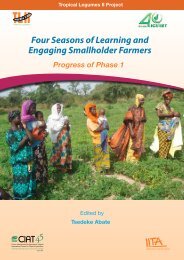Four Seasons of Learning and Engaging Smallholder Farmers - icrisat
Four Seasons of Learning and Engaging Smallholder Farmers - icrisat
Four Seasons of Learning and Engaging Smallholder Farmers - icrisat
You also want an ePaper? Increase the reach of your titles
YUMPU automatically turns print PDFs into web optimized ePapers that Google loves.
as Nigeria that will face the greatest deficits domestically. In this region cowpea dem<strong>and</strong> is projected<br />
to grow at a faster rate <strong>of</strong> 2.68% per year than supply (2.55%) over the period 2007–2030. If an<br />
assumption that cowpea increases will come from only area expansion is made, global as well as<br />
regional cowpea supply will fall short <strong>of</strong> dem<strong>and</strong>. The projections suggest that increased investments in<br />
cowpea research <strong>and</strong> extension will be key to generating a regional surplus through increased yields,<br />
whereas regional trade in cowpea will be crucial for achieving food security through redistribution <strong>of</strong><br />
the surplus thus generated among countries in WCA. If Africa <strong>and</strong> the developing world are to sustain<br />
cowpea production <strong>and</strong>, research on how to increase productivity is paramount. There is need for<br />
huge investments in plant breeding, awareness <strong>of</strong> integrated pest <strong>and</strong> disease management techniques,<br />
creation <strong>of</strong> markets <strong>and</strong> facilitation <strong>of</strong> market integration, development <strong>of</strong> efficient support systems<br />
<strong>and</strong> development <strong>of</strong> post-harvest storage technologies. The effectiveness <strong>of</strong> such efforts will ultimately<br />
depend on how closely researchers, farmers, financial partners <strong>and</strong> other stakeholders work together<br />
for a common cause.<br />
Adoption studies<br />
Results from adoption studies <strong>of</strong> cowpea technologies indicate that 72% <strong>and</strong> 81% <strong>of</strong> farmers from Borno<br />
<strong>and</strong> Kano states, respectively, have adopted improved cowpea varieties like IT89KD-288, IT90K-277-2,<br />
IT97K-499-35 <strong>and</strong> IT89KD-391.The study results show also that over 60% <strong>of</strong> adopters <strong>of</strong> improved<br />
varieties were informed about improved varieties before adoption. The study results show that farmers’<br />
participation in previous cowpea projects is important in the adoption <strong>of</strong> innovations. Frequent contact<br />
with extension <strong>and</strong>/or research agents, members <strong>of</strong> a community-based organization or cooperative,<br />
or those who have access to improved seed make a farmer more likely to adopt improved varieties.<br />
In addition, the education level, years <strong>of</strong> experience in cowpea production <strong>and</strong> l<strong>and</strong> availability have<br />
significant effects on the farmers’ likelihood <strong>of</strong> adopting improved cowpea varieties. The study shows<br />
that farmers have also adopted improved storage technologies. More than 79% <strong>and</strong> 57% <strong>of</strong> the sampled<br />
farmers in Borno <strong>and</strong> Kano, respectively, have been using double or triple bagging <strong>and</strong> hermetic drums.<br />
The study concludes that there is a need to enhance the dissemination <strong>of</strong> newly developed varieties<br />
such as IT89KD-288, IT90K-277-2, IT97K-499-35 <strong>and</strong> IT89KD-391 <strong>and</strong> storage technologies on largescale<br />
across other rural communities through effective <strong>and</strong> efficient production <strong>and</strong> dissemination <strong>of</strong><br />
seed <strong>and</strong> triple bags.<br />
Outlook <strong>and</strong> baseline<br />
Production <strong>and</strong> productivity trends<br />
Cowpea is mainly grown for food, feed, income <strong>and</strong> soil fertility improvement. As a drought tolerant<br />
crop, cowpea further possesses a useful ability to fix nitrogen in the soil through its root nodules <strong>and</strong><br />
it grows well in poor soils with more than 85% s<strong>and</strong>, less than 0.2% organic matter <strong>and</strong> low levels<br />
<strong>of</strong> phosphorus. The nitrogen fixation ability implies that cowpeas can thus contribute significantly to<br />
sustainability <strong>of</strong> cropping systems. The crop grows under rain-fed conditions as well as under irrigation<br />
or residual moisture along river or lake flood plains during the dry season.<br />
Area<br />
Global trends in area under cowpea production are shown in Figures 5-1 <strong>and</strong> 5-2. Although cowpea<br />
global area cultivated has had an upward trend since the 1970s, it increased markedly in the 1990s.<br />
From an average <strong>of</strong> about 4 million in the 1970s <strong>and</strong> 1980s, the areas increased to 8 million in the 1990s<br />
<strong>and</strong> further increased to 10 million in the 2000s. From 1970 to 2009, area planted increased by 0.24<br />
million ha per year. While the area planted to cowpea temporarily plummeted towards the closure <strong>of</strong><br />
the 1970s perhaps following the 1973/4 oil cartel which may have undermined global cowpea dem<strong>and</strong><br />
through its negative impact on incomes, areas increased from the 1980s through to 2009 part <strong>of</strong> which<br />
may be explained by the advances in plant breeding which saw a number <strong>of</strong> important varieties being<br />
released within the period following the work by IARCs <strong>and</strong> NARES. Indeed due to work by IITA in<br />
82<br />
<strong>Engaging</strong> <strong>Smallholder</strong> <strong>Farmers</strong> | Tropical Legumes II Project

















